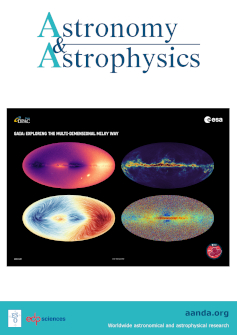JWST 黑洞观测与 NANOGrav 引力波测量的一致性
IF 5.4
2区 物理与天体物理
Q1 ASTRONOMY & ASTROPHYSICS
引用次数: 0
摘要
JWST 的观测开启了超大质量黑洞(SMBH)研究的新篇章,激发了对两个难题的讨论:高兹 SMBH 的丰度和双活动星系核(AGN)的比例。我们认为,这些谜题的答案可能与对 NANOGrav 和其他脉冲星定时阵列发现的纳赫兹引力波(GWs)数据的解释有关,这些引力波是 SMBH 双星,它们的演化是由与其环境的相互作用驱动的,最小距离可达 O(0.1 pc)。我们证明了在 JWST 数据和低ɀ非活动星系中发现的恒星质量-黑洞质量相关性是相似的,并对这些数据进行了全局拟合,排除了低ɀ AGN。要与 NANOGrav 和双 AGN 数据相匹配,就需要在宇宙学时间尺度上,在距离低于 O(1 kpc) 时,环境效应引起的双星演化是快速的。根据这种解释,低ɀ AGN中的SMBH是主要不活动星系中本地SMBH群的冰山一角。这种解释与 JWST 观测到的 AGN "小红点 "是一致的,也有利于 LISA 和十赫兹 GW 探测器观测到黑洞双星的 GW 信号。本文章由计算机程序翻译,如有差异,请以英文原文为准。
Consistency of JWST black hole observations with NANOGrav gravitational wave measurements
JWST observations have opened a new chapter in supermassive black hole (SMBH) studies, stimulating discussion of two puzzles: the abundance of high-z SMBHs and the fraction of dual active galactic nuclei (AGNs). We argue that the answers to these puzzles may be linked to an interpretation of the data on the nanohertz gravitational waves (GWs) discovered by NANOGrav and other pulsar timing arrays as SMBH binaries whose evolution is driven by interactions with their environments down to O(0.1 pc) separations. We show that the stellar mass-black hole mass correlations found in JWST data and in low-ɀ inactive galaxies are similar, and present a global fit to these data, excluding low-ɀ AGNs. Matching the NANOGrav and dual-AGN data requires that binary evolution due to environmental effects at separations below O(1 kpc) be rapid on cosmological timescales. According to this interpretation, the SMBHs in low-ɀ AGNs are the tip of the iceberg of a local SMBH population in mainly inactive galaxies. This interpretation is consistent with the ‘little red dots’ observed with JWST being AGNs, and would favour the observability of GW signals from black hole binaries in LISA and decihertz GW detectors.
求助全文
通过发布文献求助,成功后即可免费获取论文全文。
去求助
来源期刊

Astronomy & Astrophysics
地学天文-天文与天体物理
CiteScore
10.20
自引率
27.70%
发文量
2105
审稿时长
1-2 weeks
期刊介绍:
Astronomy & Astrophysics is an international Journal that publishes papers on all aspects of astronomy and astrophysics (theoretical, observational, and instrumental) independently of the techniques used to obtain the results.
 求助内容:
求助内容: 应助结果提醒方式:
应助结果提醒方式:


